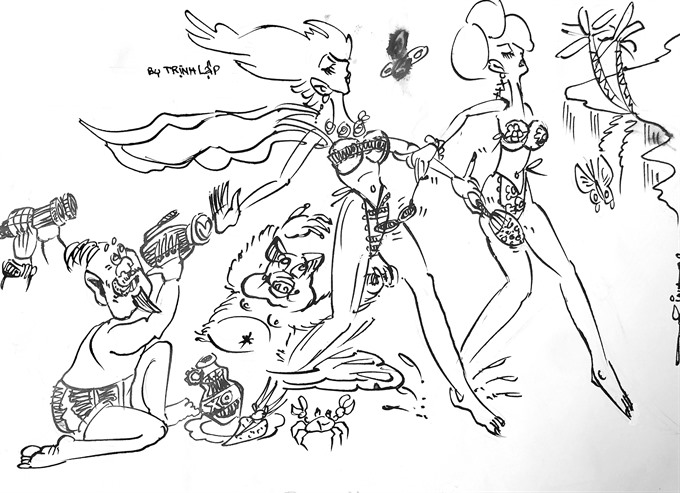 Talk Around Town
Talk Around Town

In the West, choice, freedom and right are often the catchwords, and women all over the world have been fighting for the right to equality. Solid progress has been made, but today we still hear of blatant sexual misconduct committed mostly by men against women such as those revealed by the ongoing international #MeToo movement
 |
| Illustration by Trịnh Lập |
By Linh Do
Last month, my 16-year-old cousin from America visited Viet Nam. She had been here many times before when she was a child. Yet in this visit, as a teenager with a fully grown female body, she was in for a surprise. The girl wore scanty tank tops and very short shorts as she walked around. People stared. Intrusively. Rudely. Which made her very uncomfortable. I was at a loss, not knowing how to respond to this sexually charged cultural crossroads. The girl enjoyed wearing what she wore, it was her taste, her choice, her freedom, her right. At the same time, people couldn’t help staring either.
In the West, choice, freedom and rights are often the catchwords. For about 150 years, spearheaded by Western feminism, women all over the world have been fighting for the right to be equal with men. We have gained access to education, politics and whatever sphere of life we desire. In terms of sexuality, we have made great strides. We can marry, divorce, have sex and give birth at will. We can wear whatever we want. At least in theory.
Yet, after the solid progress that has been made, today we still hear about blatant sexual misconduct committed mostly by men against women such as those revealed by the ongoing international #MeToo movement which reminds us of the lasting patriarchal psychology underwriting predatory acts. The social media movement, which borrowed the phrase “Me Too” from activist Tarana Burke who has helped underprivileged sexual abuse victims out of the limelight for years, started in the glitzy world of Hollywood, with Harvey Weinstein, a film mogul hailed for producing award-winning flicks such as Shakespeare in Love, before his downfall.
As a Vietnamese woman, I’m not surprised. This movement started in the West and captures the worst of Western culture which many feminists have long criticized as deeply patriarchal. Western culture is relentlessly mediated and visual and often treats women as sexual objects. Take, for example, Woody Allen, a quintessential male artist steeped in a cynical and arrogant culture that vaults the idea of individual male geniuses at the expense of ethical or communal values. In Match Point, Allen’s hero has to choose between his sexual passion for a girlfriend and his marriage with a wealthy wife. What does he do? He has sex with the former then kills her! (While fooling his wife of course).
Does this theme of sex and violence sound familiar, not just in the movies, but in the real rapes and murders against women and children that we hear in the news these days? In our Westernized cinematic age, when life is conflated with the stage, it isn’t surprising that women everywhere are being harassed in reality as they are in the movies. And actresses who work in showbiz and put themselves out there are inevitably more exposed to sexual misconduct than nuns who live a cloistered life. There is a difference in degree in everything, including women’s exposure, and men’s misconduct.
Philosophically speaking, when women fight for the right to be equal with men, to join the men’s stage and game, to be “represented”, they should be aware that equality is a double-edged sword. There is another value besides equality: difference. For instance, after being able to free myself from male-imposed ideas of sexuality based on beauty, visuality and quantity (rather than quality), the last thing I want to do is to come up with my own ideas of sexuality and get even. I’ll stay away from sexuality for a change.
From a non-Western and particularly Buddhist perspective, this doesn’t sound as strange as it may in hypersexual Western culture. For a Buddhist, everything starts with the mind and life and is a logical loop of desire. Life is not a stage. It is rich and pure, without exaggeration. After her trip to a southern beach where people stared at her sexy swimsuit too much, my cousin adjusted. She said intelligently: “I’ll never wear this swimsuit here again.”
That said, many Vietnamese women are mistreated.
According to a recently released report on gender equality conducted by the non-profit Swedish Fojo Media Institute, over 27 per cent of 247 surveyed female journalists (and 2 male journalists) said they had been harassed, although the number may well be higher. Perpetrators include sources, colleagues and superiors.
Tran Thi Thuy Binh, a journalist at Ha Noi Television who has researched gender for years, says sexual misconduct is often covered up because victims feel they aren’t protected and society blames them for courting what happens. The Vietnamese legal system doesn’t sympathize with victims and tends to dole out light punishments for culprits. Many cases, even cases against children, are processed slowly.
I was once subjected to unwanted touching. I was reporting on a musical show with an older male colleague. We were sitting next to each other in a dark theatre. Suddenly the man put a hand on my thigh and squeezed it. I was stunned.
My mind raced: “Oh. What is this? Is it what I’m thinking it is? Where did it come from? Did I encourage him?” My body felt numb and dull. I didn’t make a move. The man didn’t advance. Moments passed… The show ended. I stood up. The man smiled patronizingly, seeing me as an innocent piece of wood. I breathed a sigh of relief and wished never to see him again. And I never did. VNS




